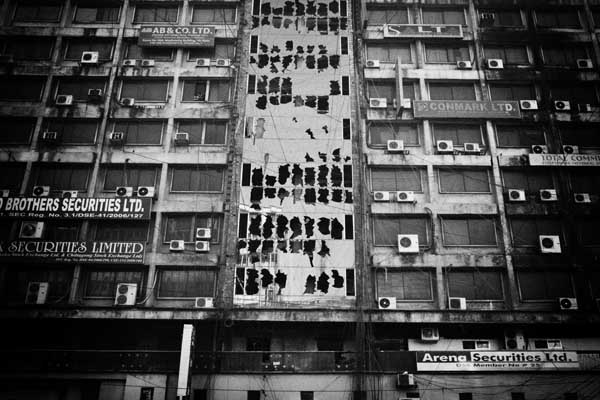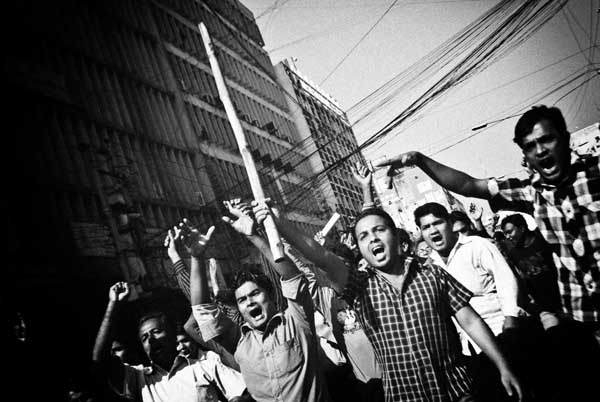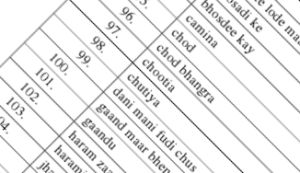Looks as if the same game is played all over the globe!
Tag: corruption
WB finds graft rampant in govt, NGOs
By David Bergman
The New Age
Thursday, 2 February, 2012
Five non-governmental organisations have admitted to the World Bank that they made corrupt payments to Bangladesh government officials to receive contracts under a bank-funded project.
The admissions are contained in a report of an investigation which the World Bank?s Integrity Vice President conducted into the disbursement to hundreds of NGOs of part of a $53.3 million loan that the bank had given the Bangladesh government to further post-literacy continuing education.
Four of the five NGOs told World Bank investigators that to get a contract under the project, which lasted between 2001 and 2007, they each had to pay at least Tk 100,000 in bribes to government officials, money that was channelled to the officials through intermediaries.
Some NGOs had to pay as much as Tk 600,000 in bribes to obtain a contract, the investigators were told. Continue reading “WB finds graft rampant in govt, NGOs”
Wahid Adnan Wins Award of Excellence in CPOY
Continue reading “Wahid Adnan Wins Award of Excellence in CPOY”
Sense of humour failure
Subscribe to ShahidulNews
Censorship in Pakistan
Economist
Nov 25th 2011, 13:04 by L.M.
AN OFTEN overlooked perk of being a country with a large population and relatively low wages is the capacity to employ people to carry out silly tasks. In India, for example, some people spend their days pasting white stickers onto maps of Kashmir printed in foreign publications (such as?The Economist). In neighbouring Pakistan, the regulatory body for telecommunications dreamed up an equally unlikely, if altogether more entertaining, assignment for its staff: to compile a list of ?undesired words? that could be used to block offensive text messages. In a remarkable show of efficiency (to say nothing of creativity), the agency managed to find?1,100 words and phrases in English and nearly?600 in Urdu. (Admittedly they may have padded it out a bit?how else to explain the presence of ?robber?, ?oui? or ?k mart? in a list that otherwise places rather more emphasis on sexual adventurism?)
Last week, the Pakistan Telecommunication Authority?s (PTA) memo and accompanying list of the words sent to mobile-phone service providers were leaked on the internet. Pakistanis were aghast and amused in equal measure. Previous bans have?targeted Facebook,?Rolling Stone magazine?s website and the use of encrypted networks. These met with limited opposition. But the directive to block text messages containing certain words was seen as an attack on free speech.
The official reason for the ban was ?to control the menace of spam in the society?. Far more likely, the authorities finally grew tired of rude anti-government jokes that circulate widely via text message. Many feature the president, Asif Ali Zardari, in a starring role. (A tame example: ?The post office issued new stamps with Zardari?s face on them but they had to be withdrawn because the public found them too confusing: it was impossible to tell which side to spit on.?) Texting is perhaps the most effective means of mass communication in Pakistan: two of every three Pakistanis have a mobile phone and the cost of sending an SMS is among the cheapest in the world. Following public uproar, damning editorials and the threat of legal action from NGOs, the authority sheepishly announced that ?implementation of previous PTA instructions have been withheld? after it ?received input from customers, government and other quarters on this issue?.
The government?s inability to take a joke isn?t restricted to text messages. In an interview with the state broadcaster on November 21st, the UN?s ?world television day?, the information minister, Firdous Ashiq Awan, stressed the need for a code of conduct to help broadcast media through an ?evolutionary phase?. There is little doubt that Pakistan?s news channels could do with some restraint, especially when it comes to coverage of terrorist attacks, which tends towards the gory. But critics fear that an enforced code of conduct would use obscenity as an excuse to target the hugely popular political satire programmes that make fun of the nation?s ruling classes. ?It?s anti-government stuff, impersonations of Zardari and company?they don?t leave anyone alone. They make all kinds of jokes, some of them quite lewd,? said Murtaza Razvi, a senior editor at?Dawn, a leading English-language newspaper.
Pakistan?s broadcasting rules were liberalised under Pervez Musharraf soon after he took power in a military coup in 1999, and the number of television channels quickly grew from a single state broadcaster to nearly a hundred channels. The government would do well to draw a lesson from the experience of Mr Musharraf, who tried to clamp down on press freedom in 2007 and found himself out of office soon after. Mr Zardari may not enjoy being the butt of jokes every night but it certainly beats having angry?protesters on the streets of Islamabad.
Rahnuma Ahmed Injured
Subscribe to ShahidulNews
Rahnuma Ahmed was amongst around twenty people who were injured as police clashed with protesters at a rally held near the National Press Club in Dhaka on 14th June 2011.
Members of the National Committee to Protect Oil, Gas, Mineral Resources, Power and Ports were protesting against the government bid to give lease of two deep-sea blocks to US oil company ConocoPhillips South Asia New Venture Ltd for oil-gas exploration in the Bay of Bengal, which they say is against the interest of Bangladesh and is designed to profit a few corrupt individuals.
The police blockaded the rally near the secretariat, and baton charged the protesters as they approached the barricade. Writer and anthropologist Rahnuma Ahmed was one of several protesters who were injured during the clashes. The government plans to sign a contract with Connoco Phillips on the 16th June 2011.
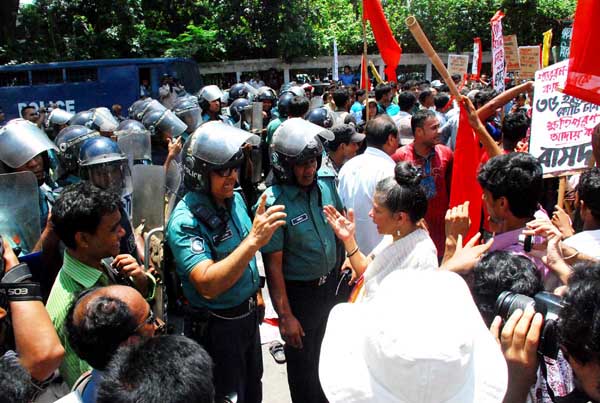
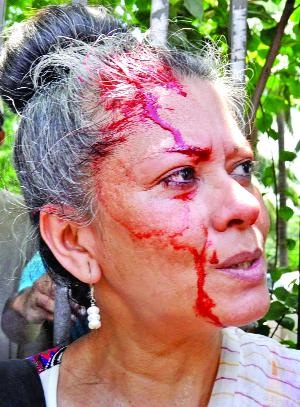
Microcredit Pioneer Faces an Inquiry in Bangladesh
Subscribe to ShahidulNews
By Lydia Polgreen
New York Times: January 29, 2011
DHAKA, Bangladesh ? Any other year Muhammad Yunus, the Nobel Peace Prize laureate and a pioneer of microcredit, would be in Davos, Switzerland, this week. For years he has been celebrated at global gatherings like the World Economic Forum there for helping move millions of impoverished women toward a better life through tiny but transformational loans.
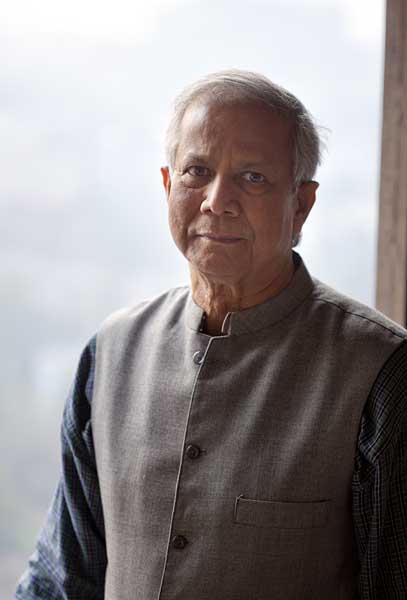
Instead, he was in court again on Thursday, facing accusations, considered frivolous by most accounts, that one of his nonprofit companies adulterated vitamin-fortified yogurt. On Jan. 18, he was summoned to a rural courtroom to face charges of defamation lodged by a local politician.
Microcredit, the idea that Mr. Yunus popularized as a path out of penury for those long excluded from the banking system, has increasingly come under scrutiny. Scholars have cast doubt on its effectiveness in fighting poverty, and politicians and other critics accuse microfinanciers, many of whom, unlike Mr. Yunus, profit from the loans, of getting rich off the poor.
Now, the government of Bangladesh has ordered a wide-ranging inquiry into the microfinance institution he founded 34 years ago, Grameen Bank, after a Norwegian documentary accused him of mishandling donors? money. Norway?s government has said no money was misused. Still, Mr. Yunus?s troubles will deepen what has become a global crisis in microfinance that threatens to undermine the very concept ? small loans to poor people without collateral ? on which his reputation rests.
Long accustomed to adulation at home and abroad, suddenly, at 70, Mr. Yunus, Bangladesh?s best-known citizen, finds himself very much on the defensive. In an interview at his office here, Mr. Yunus seemed stunned and deeply stung.
?There is some kind of misinformation,? he said, his voice trailing off. ?I shouldn?t say more.?
A pause.
?Every word I say will be held against me,? he said finally.
On one level, his troubles seem to be largely political. Mr. Yunus, who leads a spartan life, has for decades floated well above the muck of Bangladeshi politics. Then in 2007, while a caretaker government backed by the military ruled Bangladesh, he waded in, egged on by supporters who argued that his leadership was needed in a time of crisis.
He declared in an interview that Bangladeshi politics were riddled with corruption. He floated a short-lived political party. Bangladesh?s political class did not take kindly to being lectured by the Nobel laureate. The steely leader of one of the main political parties, Sheikh Hasina Wazed, took umbrage, analysts say.
In the 2008 election that restored democracy after a two-year interregnum, Ms. Hasina led her party, the Awami League, back power with a vast majority. Her critics say that in lashing out at Mr. Yunus she is simply trying to eliminate a political rival.
But lost in the talk of politics is a more complex question: how to ensure that Grameen Bank, which has 8.3 million borrowers, has loaned $10 billion and has become an indispensable part of Bangladesh?s social and economic fabric, outlives its charismatic founder? Mr. Yunus is now a decade beyond the bank?s mandatory retirement age, and apparently there is no successor in sight.
Long-serving internal candidates that might have replaced Mr. Yunus as the bank?s managing director after his retirement have departed acrimoniously.
The government recently appointed one of his former deputies, Muzammel Huq, as chairman of the board. Mr. Huq has been a vocal critic of Mr. Yunus, and the promotion of a former underling has been taken as a sure sign that the government seeks to oust the bank?s founder.
?I think he is a good man with a small heart,? Mr. Huq said of Mr. Yunus. ?He cannot give credit to anyone but himself,? he added, with a wan smile at his pun.
Microfinance experts worry that a government takeover of Grameen Bank may turn it into a tool of political patronage and destroy it. Mr. Yunus said that he was eager to step down, but that the transition must be handled carefully to avoid panic among borrowers and the bank?s employees.
?I am riding the tiger,? Mr. Yunus said. ?I cannot just get off the tiger without drawing the attention of that tiger. So I have to very quietly do it.?
The Norwegian documentary accuses him of improperly moving $100 million that has been donated by Norway for microcredit to another Grameen nonprofit organization. The Norwegian government later confirmed that the money had been improperly moved, but it cleared Grameen of any wrongdoing.
Continue reading “Microcredit Pioneer Faces an Inquiry in Bangladesh”
Nobel Peace Prize winner?s reputation under threat in riddle of ?40m loans
Subscribe to ShahidulNews
*Fariha Karim, Dhaka, and Francis Elliott, Delhi*
The Times of London
The reputation of a Nobel peace laureate, credited with helping to defeat?global poverty through microcredit, hung in the balance last night after?allegations that he had diverted ?40 million from a bank set up to help the?poor.
Muhammad Yunus, internationally f?ted as banker to the world?s poor, now?faces an investigation by the Norwegian Government, which donated funds to?him.
It marks a further blow to the reputation of microfinance, once hailed as?the most effective way to help the most needy out of poverty.
The model of extending small loans to help to stimulate entrepreneurial?activity was pioneered by Dr Yunus in Bangladesh. It won him the Nobel Peace?Prize in 2006.
But letters obtained by a Norwegian film-maker suggest that Oslo?s embassy?in Dhaka was furious to discover that cash donated to his microfinance?vehicle, Grameen Bank, for housing loans had been diverted to another?company without its knowledge or permission. The arrangement, which Dr Yunus claimed had been made for tax reasons, was not mentioned in Grameen Bank?s annual report.
When his actions were challenged in formal correspondence, Dr Yunus wrote to?the head of an aid agency, Norad, asking for its help.
?This allegation will create a lot of misunderstanding within the Government?of Bangladesh. If the people, within and outside government, who are not?supportive of Grameen get hold of this letter, we?ll face real problem[s] in?Bangladesh,? he wrote.
Dr Yunus was ordered to return the money but while about ?17.6 million was?repaid, the rest of the funds were used for other social causes including?victims of cyclones, according to the Norwegian Government.
The chain of events ? which took place between 1996 and 1998 ? came to light?this week after the letters were aired as part of a documentary on microfinance that was shown on Norwegian television.
Although it said that there was no suggestion of tax fraud, a minister in?the current Oslo administration said that it was ?totally unacceptable? that?aid was used for purposes other than what was intended.
A report into the matter has now been ordered by the International?Development Minister after questions in the Norwegian parliament.
Dr Yunus could not be contacted for comment in Bangladesh last night and?aides said that he was out of the country.
A statement released by Grameen Bank said that the claims were false and?that a full explanation would be provided at the ?earliest convenient time?.
The Nobel Committee stood by Dr Yunus last night, admitting that it was?aware of ?isolated incidents? relating to Grameen Bank when it awarded him?the Peace Prize, but it does not plan to raise any further questions.
The director of the Norwegian Nobel Institute, Geir Lundestad, said: ?The?Norwegian Nobel Committee looked into Yunus and the Grameen Bank very?thoroughly before he was awarded the Peace Prize in 2006, and we used many?international and Norwegian experts to find out about the larger picture and?not just the isolated incidents. On this basis he was awarded the prize for?2006 and we are not raising any questions in this context.?
He refused to clarify whether the committee was aware of allegations of?financial irregularities, saying: ?We have a 50-year secrecy rule. I?m not?commenting on anything else.?
Erik Solheim, the Norwegian Minister of the Environment and International?Development, insisted that there were no suspicions of tax fraud or?corruption committed by the bank.
He added: ?Having said that, the Government of Norway finds it totally?unacceptable that aid is used for other purposes intended, no matter how?praiseworthy the cases might be.
?In the light of an audit review in 1998, Grameen Kalyan returned 170?million kroner [?17.6 million] to Grameen Bank. The additional funds have?among other projects been spent on emergency aid after a devastating cyclone?hit Bangladesh.
?I will ask the Norwegian Agency for Development Co-operation for a full?report into this matter. At the same time it is important to stress that we?are firm believers in microfinance as a tool in the fight against poverty.?
The allegations will further fuel the controversy surrounding microfinance?amid concerns that what has grown into a massive and largely unregulated?industry is doing more harm than good.
The Indian state of Andhra Pradesh, the hub of small-loan activity, cracked?down on microfinanciers after accusations that high interest rates and?aggressive debt collectors had led to more than 30 suicides.
Report in bdnews24.com
Earlier article on Grameen Bank
Long March
Subscribe to ShahidulNews
Day One
Dhaka to Gazipur
Bangladeshi citizens began a long march from Dhaka to Dinajpur to protect the country’s natural resources. The march began at Muktangon in Dhaka with a rally and the first day ended in Gazipur with a cultural programme. People joined along the way. The march will end with a rally at Phulbaria in Dinajpur on the 30th October 2010
Latest update from Taslima Akhtar: 9:43 am. 25th Oct 2010: Rally now headed for Tangail District. Via Konabari and Chondra.
Update from Taslima Akhtar: 12:01 pm 26th October 2010: Rally left Sirajgonj, heading to Bogram via Hotikimrun and Gurkha Point. Stopping soon for lunch.
Long March leaving Sherpur for Bogra Shodor. Source Taslima Akhter 16:35 pm. 26th Oct 2010
Arrived at Bogra. Public Meetings. Overnight in Bogra: Source Taslima Akhter 19:48 pm. 26th Oct 2010
Heading 2 Mahasthangar, St. rally n Mokomtola upazila. lunch @ Gobindogonj then 2ward Gaibandha: Source Taslima Akhter 11:58 am 27/10/2010
Arrived in Gaibandha. Source Taslima Akhter 14:35 pm 29/10/2010
Left Gaibandha for Rangpur at 10:00 am. Will be passing through Sadallahpur and Madargonj upozilas before stopping at Peergonj where we will have lunch at noon: Taslima Akhter 11:42 am 28/10.2010
Left Rangpur. Expect to arrive in Sayedpur around noon via Paglapeer and Taragonj. Numbers steadily growing as more people join the procession: Taslima Akhter 10:49 29th October 2010

More recent photos by Taslima Akhter of Long March
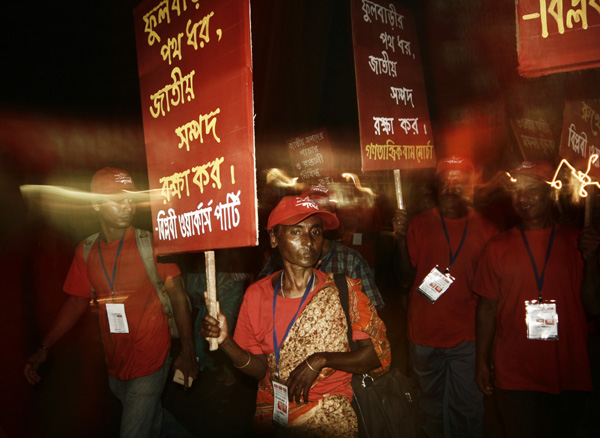
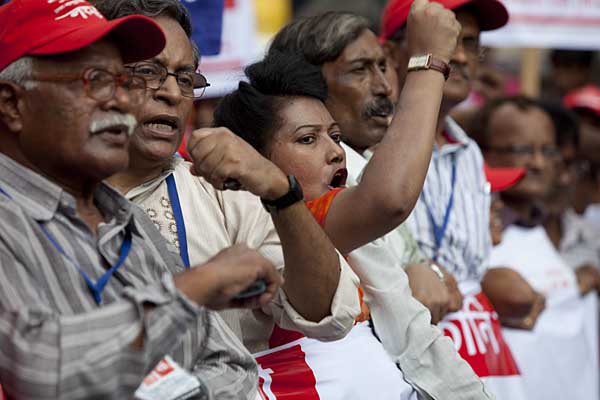
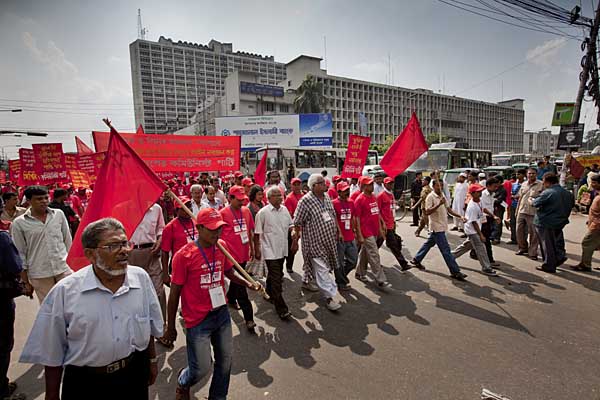
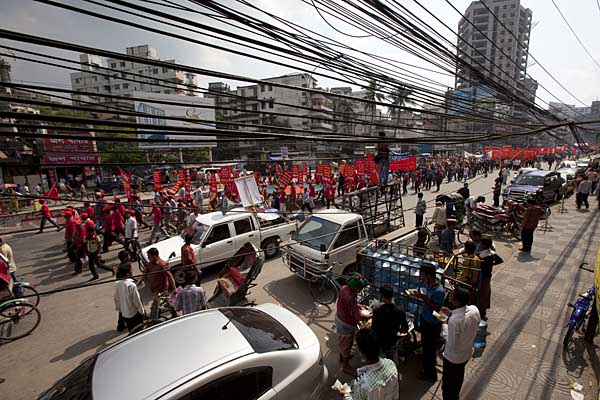
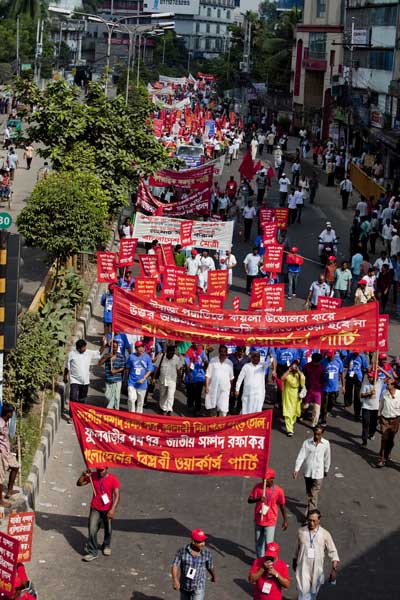
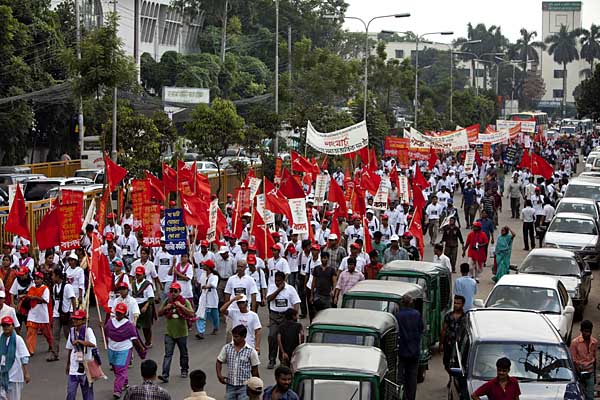
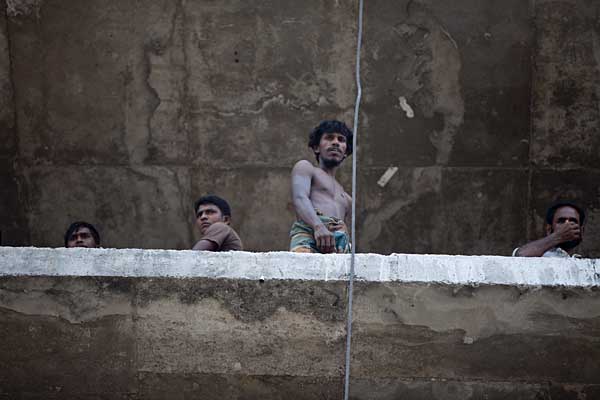
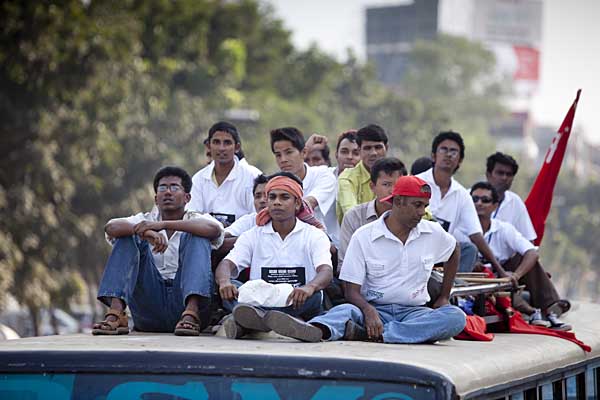
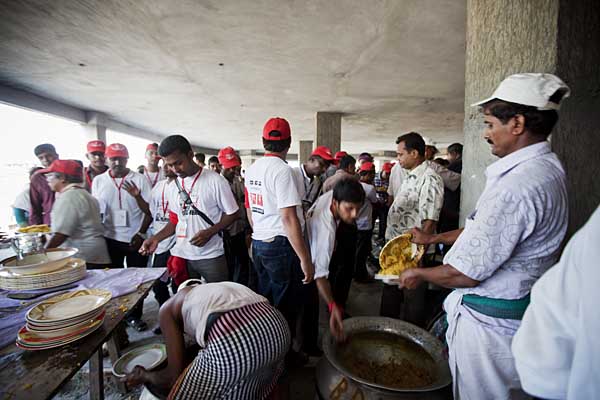
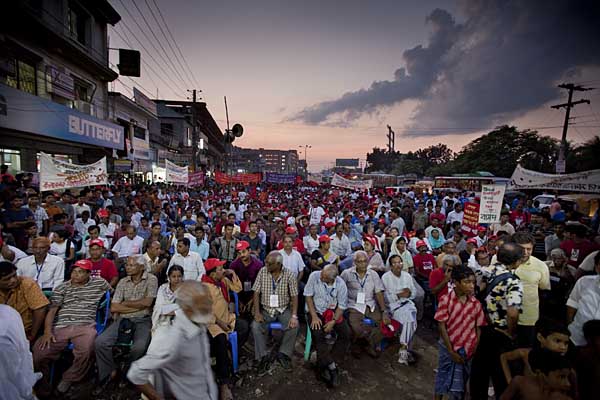
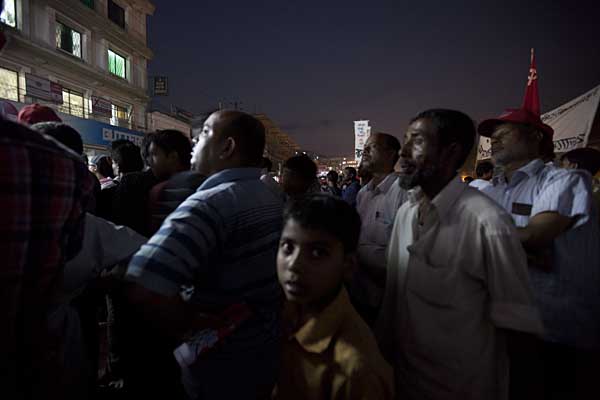
Pentagon's Prayers
By Rahnuma Ahmed
As more US troops surge into Afghanistan, as Predator drone attacks on Pakistan’s north-western villages increase, as news of operations by killing squads of US Special Forces on the Afghanistan side of the border intensifies, as yet another `front,’ a fifth one, opens up in the US-led war on terror, this time in Yemen?under the presidency of a Nobel Peace laureate?I return yet again to the day which supposedly re-wrote US history, which schematised history anew, into two distinct periods: Life Before, and Life After 9/11. How can I not? Unabated vengeance. More wars. To kill, loot and plunder….
That the prayers of those dubbed as representing the forces of `evil’ i.e., the “al Qaeda terrorists”?practitioners of a “fringe form of Islamic extremism” whose “directive commands them to kill Christians and Jews” (George Bush, September 21, 2001 )?were fulfilled on 9/11, seems to be obvious.
But the prayers of forces representing `good,’ that these too were met on 9/11, is not thought to be similarly obvious. Or, even if it is, it’s not similarly acknowledged. Not by western politicians. Nor by military leaders, defence analysts, security experts, writers, journalists?all those who speak in the name of the west. Who cling to the idea that it was a “surprise attack.” That it was carried out by “a collection of loosely affiliated terrorist organizations known as al Qaeda” who hate “our freedoms.” That it was an “act of war,” not only against the US, but against “civilization.” And that?since these terrorists number thousands and are spread in? “more than 60 countries”?America must declare war against “terror,” one which must be global, the likes of which have never ever been seen before. One that “begins with al Qaeda, but.. will not end until every terrorist group of global reach has been found, stopped and defeated.”
And thus we see newer fronts open up as the niceties of awarding Barack Obama the Nobel peace prize are endlessly talked about in polite circles, ooh, what a sweet gentle hint, ooh these Norwegians are so subtle…
Wars, however, are not subtle. As for the forces of `good,’ unlike those deemed evil, these do not? belong to the fringes. Neither of the American state, nor of western civilisation. They occupy its centre. Which is possibly why `their’ having prospered due to 9/11, is a heretical idea.
But only in the west. Outside its bounds, in the rest of the world, people talk about it. Freely.
Accounting. Before and after
In a speech to Pentagon employees on September 10, 2001, Secretary of Defense Donald Rumsfeld disclosed that over $2,000,000,000,000 (yes, twelve zeroes) in Pentagon funds could not be accounted for. “According to some estimates,” he said, “we cannot track $2.3 trillion in transactions.”
His statement didn’t make world headlines the next day. The 9-11 attacks had reduced its colossal significance to dust. As it had, the Twin Towers. But news of Pentagon’s “financial disarray” has never been headlined in western mainstream media. Strange, considering its scale, its enormity. It’d have made many third world governments?often enough unhappy recipients of lectures on good governance, elimination of corruption, accountability?ecstatically happy. May be, that’s why. It’d have undermined the west’s moral authority and of course, you can’t allow the plebs to laugh at the emperor’s nakedness.
Almost $7 trillion has been adjusted in the Department of Defense’s (DOD) financial ledgers, said a report released by the inspector general of Pentagon in 2000, “to make them add up.” Of this amount, no “receipts” were available for $2.3 trillion (presumably the sum Rumsfeld mentioned) (Associated Press, 03.03.2000). An investigative report published a week before 9/11 cites an 8 page summary of the DOD’s deputy inspector general. To compile the required financial statements, it says, $4.4 trillion had to be “cooked”; of this amount $1.1 trillion couldn’t be supported by reliable information. Another $1 trillion, at the end of Bill Clinton’s last full year in office, “was simply gone and no one can be sure of when, where or to whom the money went” (Insight, 03.09.2001 Rumsfeld_Inherits_Financial_Mess[1].pdf ).
Rumsfeld had promised reforms which would help transfer billions of dollars from the “bloated” bureaucracy to the battlefield. But 9/11 happened the next day. Spurred by anthrax fears, Congress soon approved a $40 billion (this has nine zeroes) emergency measure; a year later, the national defense budget totalled $400 billion, biggest since the cold war. It didn’t include Iraq’s occupation costs, covered by a $35 billion supplemental bill. Interestingly enough, the budget was accompanied by a bill, Defence Transformation for the 21st Century, which significantly lessened congressional oversight on military spending (Guardian, 22 May 2003).
So, where did all those trillions go? In this age of euphemism, writes Kelly Patricia O’Meara, the government has its own words for “missing” money. Unsupported entries. Material-control weakness. Adjusted records. Unmatched disbursements. Abnormal balances. Unreconciled differences. Rumsfeld had his own explanation, too. It was because of “gridlock” and not “greed.” “We cannot share information from floor to floor in this building because it’s stored on dozens of technological systems that are inaccessible or incompatible.” DOD, it seems, has hundreds of computer systems which run varied accounts?health care, payroll, inventory,? ones that are not integrated.
Scoffing at what she terms the `computers don’t talk to each other’ explanation, Congresswoman Cynthia McKinney, one of the few truly people’s representative in the US legislature says, when they tell us the money was lost, what it really means is that the money went some place, but they don’t want to tell us where it went.
Business analyst Joshua Daniels adds up the figures and points his fingers elsewhere. The entire US defense budgets from 1996 to 2001, says Daniels, add up to $1.6 trillion. To reach the $2.3 trillion figure, one would have to go further behind, to 1991. Now, its not possible, he says, that the Pentagon spent hundreds of billions and didn’t get a single receipt. Or, that the Government Accountability Office (GAO) failed to notice that the entire defense budget went missing for ten years. After all, soldiers and sailors were paid, tanks and missiles were bought etc. “The missing money wasn’t on the books to begin with. It couldn’t have been; it’s more money than we gave them.” Where could it have come from then? Only the Federal Reserve, says Daniels, has such colossal sums at its disposal, and we should be asking: who hired the Pentagon to do whatever they hired it to do? What are they paying for? Who is its target?
One may not know where the missing trillions went, but that the US military-industrial complex rewards those responsible for the (mis)deed is pretty clear. Comptroller Dov Zakheim (a signatory also to the Project for a New American Century) left Pentagon in March 2004 and joined Booz Allen Hamilton ?the “most prestigious management firm in the world”(Time), which works on defense and homeland security matters?and is now vice-president there. Two former DOD officials, William J Lynn III (chief financial officer, 1997-2001) and Robert Hale (assistant secretary of the Air Force, Financial Management and Comptroller, 1994-2001) were brought back to the Pentagon by Obama, while president-elect, in January 2009, to the posts of deputy secretary of defense, and undersecretary of defense (comptroller), respectively. Hale had been working as chief lobbyist for Raytheon, a major American defense contractor.
Coincidentally, when the Pentagon was hit on 9/11, the “plane” hit an office of the Army where an investigation of the of the $2.3 trillion missing was taking place. The office lost 34 of its 45 employees, most of whom were civilian accountants, bookkeepers and budget analysts?officials who were reportedly working on the investigation. I will not go into the details of why believing the government’s account of what happened at the Pentagon on 9/11 is intellectually demeaning, but quickly quote Colonel Karen Kwiatkowski who writes, “the secretary of defense… in an unfortunate slip of the tongue referred to the aircraft that slammed into the Pentagon as a missile…”
After Christ. Atoning for the sins of others
To put the missing trillions of taxpayers money into perspective, O’Meara writes, it would have bought
(a)?? nearly 14 million accounting degrees from any four year state college, estimating the cost at $20,000 per year. Or,
(b)?? about $8 million single family houses costing $140,000 per home.
A far lesser sum, only US$22.6 billion per year, would provide access for all to improved water and sanitation services.
Another way of putting Pentagon’s missing trillions into perspective, one that I read somewhere on the internet, was: if Christ had spent a million dollars a day for two thousand years, by now he’d only have spent three-quarters of one trillion dollars.
He, of course, would have spent it differently.
Doctoral Complicity in State Terror
By rahnuma ahmed
I take liberties with English language as I write “doctoral” to indicate the complicity of doctors and hospitals, both public and privately-owned ones, in short, the Bangladesh medical establishment’s actions which aid and abet state functionaries who have committed acts of terror?whether those in the police force, or RAB (Rapid Action Battalion), or in any of the military intelligence agencies, such as the DGFI (Directorate General of Forces Intelligence)?to cover it up.
Doctoral, as an adjective, refers to a doctorate, the highest degree awarded by a university. But as a transitive verb, as in doctoring, it means to change something in order to make it appear different from the facts. From the truth. In other words, to deceive.
Is that what doctors did in the case of Anu Muhammad? Did they doctor the facts to cover up marks of police brutality? Anu, a well-known and widely-respected public intellectual and activist, also a professor of economics, was brutally attacked by the police on September 2. Did they also doctor the facts in the case of F M Masum, crime reporter of this daily, who was tortured by RAB officials just because he had asked them why they were beating up a woman? Did doctors in either, or both cases, work against the good of their patients, in violation of their Hippocratic oath? Did they utter or write down words, undertake actions that? were not to the best of their ability, ones that were intended to make grievous injuries appear harmless? Ones that prolonged their patients injuries instead of helping them heal?
Is medical ethics taught in the medical colleges? Do students see their teachers practise it?
Pretty Packaging Outside
I was busily working on my manuscript?the reason for having been absent from the pages of New Age for the last three months?when my mobile beeped: `Anu and other tel-gas cmttee leaders beaten up by police.’
I called and was horrified to hear that the police had targeted him, had charged at his head with batons, an attempt foiled by brave young members of the National Committee to Protect Oil, Gas, Mineral Resources, Power and Ports. They had borne the brunt of the attacks as he fell down on the street. The thousand strong procession was heading toward Petrobangla headquarters?in Anu’s words, “a multinational company base that no longer represents the wishes of the people”?to protest against the government’s decision to award three offshore blocks to international companies.
Anu had been rushed to Dhaka Medical College Hospital, the nation’s most reputed public hospital. His legs were X-rayed before being put into plaster casts. We need to carry out other tests, said the doctors, as he lay on a trolley. But since the hospital was overfull and there were no empty beds, said Anu, my family and friends took me to Square hospital instead. They knew it was expensive, but a recent health insurance policy was expected to cover the costs. He added, they were concerned about whether I had suffered any internal injuries.
So, I prodded him, how was the treatment at Square? It is a hospital that is owned by the Square Group; Tapan Chowdhury, the managing director of the group was the power and energy adviser to the military-installed caretaker government (2007-2008); the hospital, as its website advertises, is affiliated to hospitals abroad (USA, India, Singapore). You had no broken bones, so why is it taking this long to heal, I asked. And I saw all these hotshots flocking to the hospital to see you, Khaleda Zia, government ministers. Why, I believe, even the health minister, an orthopaedic surgeon, went to see you, no? Yes, that was the problem. What on earth do you mean?
Well, you see, at Square they carried out a lot of tests, blood, urine, ultrasound, CT scan, but no one did a physical examination of my feet, legs, no one looked at the bruises, pressed or poked to see where it hurt, whether I could move my toes, during the four days that I was there. Yes, they changed the DMCH plaster casts, I was upgraded to fiber optic casts, they look prettier, but no physical examination was done.
And then, the health minister Dr Ruhul Haque came to see me on the 5th. I was planning to leave the hospital the next day, which I did, but the impression I had gotten from my doctors was that my legs would need to be in casts for a month or more, that I would need to come for regular check-ups. But the very next morning, after the health minister’s visit, the same doctor who had said I would need them for a month, came and got rid of them. And then, all these doctors disappeared. Very mysteriously.
The hospital issued a discharge certificate, it says, I had “improved satisfactorily.” I don’t know which tests demonstrated that. It also said I should use a walking stick. But that was pretty absurd, since I couldn’t stand up for the briefest of seconds. Not for a good fortnight after I left Square.
And what happened after you went home? Well, I couldn’t move, the pain got worse. Luckily, a doctor friend of mine dropped in regularly, he showed me some physiotherapy exercises, he told me how to move my body, how to avoid putting weight on my feet. You mean to say he did what the doctors at Square should have done? Anu grinned, but the smile didn’t quite reach his eyes. And I hear there was pus?? Oh yes, my feet were heavily bruised because the police had kicked at my feet with their boots, they had nearly jumped on my feet, so they were all swollen. And then, another doctor friend got hold of two orthopaedic surgeons. They were pretty shocked when they came and examined me. They prescribed antibiotics immediately, which gradually got rid of the swelling and the pus, and that intolerable pain. If it hadn’t been for them I definitely would not have recovered as I have, now.
While listening to Anu, I riffled through his medical file, looking at his discharge certificate, his blood reports, other reports. A line caught my eye, Thank you for being with Square. Yes, I thought, but is Square with its patients?
Pretty packaging outside. Ugly politics inside.
Discharged in the Middle of the Night
F M Masum, crime reporter, New Age was tortured by RAB officials, first at his home, and then later at RAB-10 headquarters. Not only had he protested, he had dared to ask RAB officials to speak civilly. As they should, being employees of the state, paid by the public exchequer. In exchange, they barged into his house, beat him up, blindfolded him, rubbed salt into his wounds. The torture grew worse, said Masum, when I showed them my ID card. According to them, Nurul Kabir had made things difficult for them. They had “suffered” because of his outspoken views, that’s how they put it.
After Masum’s release was finally secured an excruciating ten hours later, with the intervention of the home minister, his colleagues took him to the DMCH. It was nearly midnight. Were you examined? Well, the DMCH X-ray machine was out of order so I was taken to a private lab, we returned to the hospital with X-ray and CT scan reports. And then? They said, everything was fine and I could be taken home.
Even though you were covered with torture wounds? Even though your body and feet were swollen? Even though you were said to be in severe pain and should have been examined for internal injuries? Well, yes.
Masum was admitted to the Dhaka Community Hospital at Maghbazar Railgate the next day. And how are you now? I asked. Well, my feet still hurt a lot. And your ears? Oh, it’s much better now. Once the blood clot has completely dissolved, the ENT specialist said he’ll be able to examine and see whether my eardrum has suffered any rupture.
But DMCH has had courageous doctors too. I remembered Dr Shamsul Alam, professor of surgery, who accompanied communist leader Ila Mitra to Calcutta in the mid-50s. She had been imprisoned, tortured and raped by the police after the Tebhaga movement flared up with peasants demanding two-third share of the produce from their landowners. While serving a ten-year prison sentence she had fallen ill, had been hospitalised. Embarassed at street protests at home and outrage abroad, the Pakistan government released a weak, frail and emaciated Ila Mitra on parole, agreeing to let her go to Kolkata for better treatment. `But your khalu had to pay the price,’ his widowed wife reminded me. `They transferred him to Chittagong. They didn’t give him the promotion that was due.’ There are still a few left, I thought, as I remembered the words of gratitude Bidisha (ex-wife of former president Ershad) had written of Dr Afzal of Bangabandhu Sheikh Mujib Medical university where she had been hospitalised. She had been remanded, and allegedly tortured by DGFI officials. Hospitals too, since Dhaka Community Hospital had admitted Masum, and had continued to treat him despite receiving intimidating phone calls.
I am sure there are other instances too. But the rest? Too busy doctoring to be real doctors.
Published in New Age, 9 November 2009


